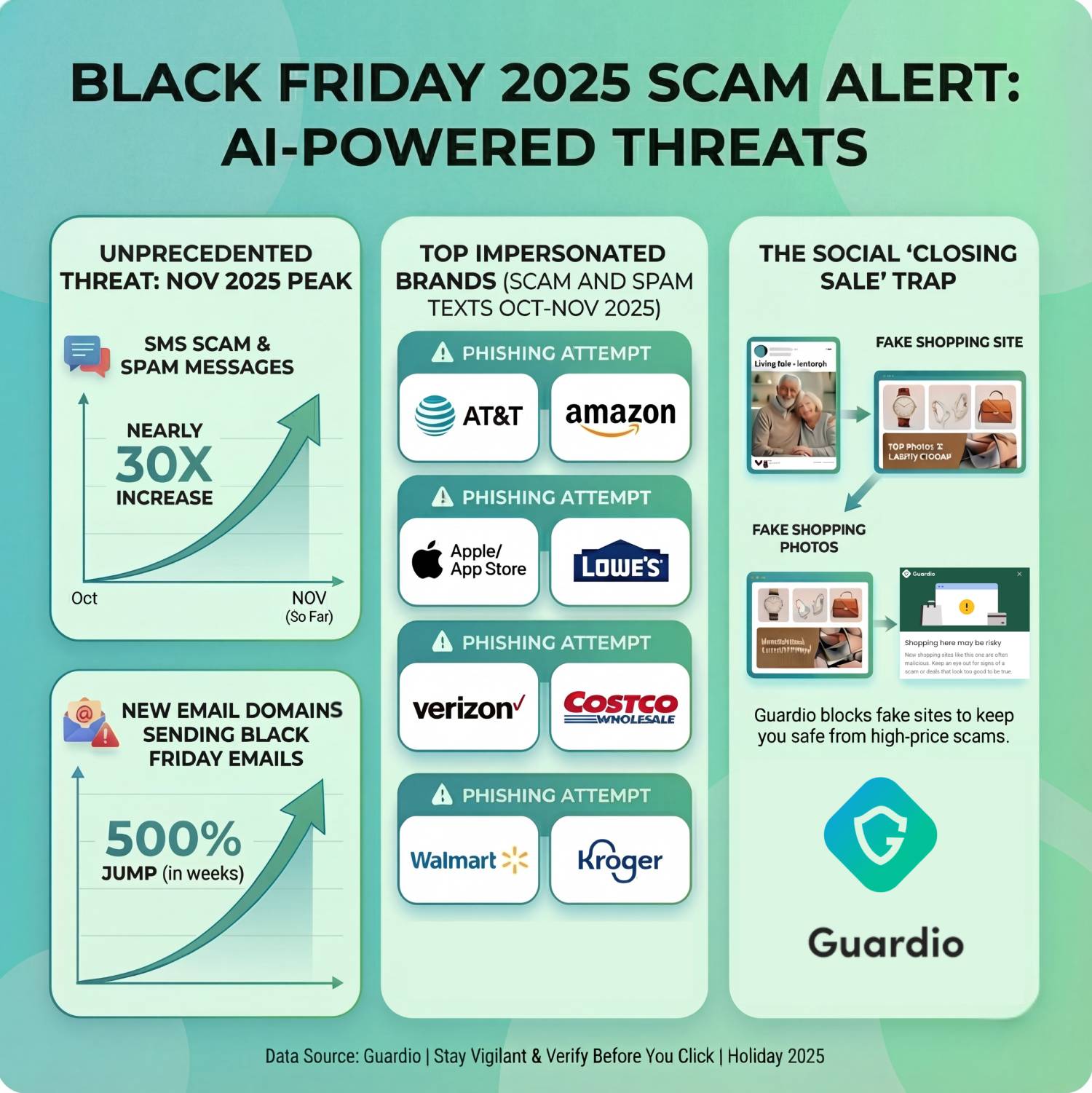Black Friday and Cyber Monday 2025 Scams: Guide to Safe Shopping

Key Takeaways
- Urgency and pressure are common scam tactics
- Verify the sender and URL by using official channels
- Never share passwords or one-time codes through messages
- If you clicked, change passwords and review account activity
- Real-time warnings can help stop lookalike sites before you enter details
Black Friday is no longer just a shopping day—it's become a hunting ground for cybercriminals armed with artificial intelligence. While you're searching for deals on gifts and gadgets, scammers are deploying technology that makes their traps virtually indistinguishable from legitimate retailers. The numbers tell a stark story: Americans lost over $432 million to online shopping fraud in 2024, and experts predict 2025 will shatter that record as AI-powered attacks reach unprecedented sophistication.
What makes this year different isn't just the volume of scams—it's their quality. At Guardio, where we track millions of threats in real-time, we're witnessing a nearly 30x increase in shopping-related SMS scams over the past few months, with November hitting peak levels. Moreover, the number of unique email domains pushing Black Friday messages has exploded by over 500% in just weeks. Scammers aren't working harder; they're working smarter, using the same AI tools that power legitimate businesses to create attacks that fool even security-conscious shoppers. The playbook has changed, and so must your defenses.
This isn't meant to scare you away from online shopping—it's meant to arm you with the intelligence that most shoppers don't have. In this post, we'll expose the exact tactics scammers are using this Black Friday, show you how to spot threats that look completely legitimate, and give you practical strategies to shop safely. Before we dive into the specific scams, know this: using trusted security software like Guardio before making purchases adds a critical layer of protection, catching threats your eyes can't detect.
Ready? Let's make sure your holiday shopping stays joyful, not costly.
{{component-cta-custom}}
Black Friday and Cyber Monday Scams
Think about your mental state when shopping on Black Friday: you're comparing prices across multiple tabs, your cart is filling up fast, promotional emails are piling in, and you're racing against countdown timers screaming "SALE ENDS IN 10 MINUTES!" This is exactly the chaos scammers count on. They know that when your brain is overloaded and focused on finding the best deal, your usual skepticism takes a backseat. And their endgame? Harvesting your credit card details, stealing login credentials, or collecting personal data that gets sold on the dark web for identity theft schemes.
The psychology behind holiday scams is simple: distraction plus urgency equals vulnerability. Between juggling gift lists, managing budgets, and tracking multiple deliveries, you're making dozens of quick decisions daily. Cybercriminals exploit this decision fatigue. They're not just sending random attacks; they're timing their scams to coincide with the exact moments when you're most likely to click without thinking. A fake delivery notification when you're expecting five packages? An "account suspended" alert when you've just created accounts on three new shopping sites? These aren't coincidences; they're calculated strikes designed to bypass your defenses when they're at their weakest.

But here's what you need to know: 2025 isn't just another Black Friday season with the usual scams. The threat landscape has fundamentally changed, and the data we're seeing at Guardio is unlike anything from previous years. So, what are some of the most notorious scams that rear their ugly heads on Black Friday and Cyber Monday—and what makes this year different? In the following sections, we'll dive into the specific threats you need to watch for and how to stay safe during your holiday shopping experience.
AI-Powered Scams
Here's the uncomfortable truth: the scams that worked on your tech-savvy friend last year weren't better—they were powered by artificial intelligence. Research shows that 76% of phishing sites now use AI-generated content, which means perfect grammar, professional designs, and convincing copy that makes traditional "red flags" obsolete. The old advice to "look for spelling errors" or "check for poor formatting"? That's ancient history. AI has eliminated those telltale signs, creating scams that fool even the most careful shoppers.

AI has given scammers superpowers that were science fiction just a few years ago. They can now generate thousands of fake shopping websites in hours, complete with professional product descriptions, realistic customer reviews, and stolen brand imagery that looks authentic. AI tools allow criminals to create personalized phishing emails that reference your actual shopping habits, making messages like "Hi Sarah, regarding your recent browsing of the Sony headphones..." feel legitimate even though you never signed up for that retailer's emails. Even more concerning, AI can clone, entire websites, voices, and images, enabling phone scams where criminals impersonate customer service representatives with perfect accuracy. The technology that makes our lives easier is also the one that makes fraud virtually undetectable.
So how do you protect yourself when scams look this legitimate? The answer is changing your behavior, not just your awareness. Stop trusting what you see like a professional-looking website, perfect grammar, or a five-star review doesn't mean anything anymore. Instead, verify through separate channels: if you get an email about an order issue, don't click the link; open your browser, type the retailer's URL yourself, and check your account directly. Search for unfamiliar brands on Reddit or Trustpilot before buying. Use security tools like Guardio that employ AI detection to fight AI-generated scams, because in 2025, visual inspection alone isn't enough to keep you safe.
SMS/Text Scams
If your phone has been buzzing more than usual this November, you're not imagining it. Our team at Guardio has detected something alarming: a nearly 30x increase in shopping-related scam and spam SMS messages over the past few months, with November marking the peak so far. Why the explosion? Because scammers know you trust your phone more than your computer. While we've been trained to view emails skeptically, text messages still feel personal and urgent, which is exactly what makes them so dangerous. In October 2025 alone, our data shows scammers aggressively impersonating the exact brands you're shopping with this holiday season: AT&T, Amazon, Apple/App Store, Lowe's, Verizon, Costco, Walmart, and Kroger.

The most common trap is the urgent account alert. You receive a text claiming your Amazon account has been "suspended due to suspicious activity" or your Verizon bill "couldn't be processed" and you need to "verify your information immediately" by clicking a link. Another variation warns of an "unusual charge" on your card and asks you to confirm it wasn't you. These messages create panic by design; they know you're making multiple purchases and managing several accounts during Black Friday, so a security alert feels plausible. When you click that link and enter your login credentials or credit card information, scammers capture it in real-time.
Here's your defense: Never click links in unsolicited texts claiming account problems, payment issues, or security alerts. If you receive a text from any of the brands mentioned above (or any company, for that matter) close the message, open the company's official app or website directly by typing the URL yourself, and check your account status there. Real companies will show legitimate alerts in your account dashboard. If there's no alert there, the text was fake. And remember: legitimate businesses will never ask you to "verify your account" or "confirm your payment method" via text message. When in doubt, call customer service using a number you find independently—never one provided in the text.
Social Media Scams
Black Friday scams aren't just hiding in your email inbox—they're flooding your social media feeds, and they're designed to catch you during those mindless scrolling moments when your guard is down. One of the most disturbing trends we're tracking at Guardio is the explosion of fake "closing sale" ads on Facebook and Instagram. Picture this: You're scrolling through your feed when you see a heartwarming video or photo of an elderly couple—a jeweler, a leatherworker, a watchmaker—who are "retiring after 40 years" and offering "everything at a loss" for their final sale. The story tugs at your heartstrings. Who doesn't want to support a struggling small business during their going-out-of-business sale?

But here's the trap: When you click through, you land on a website that looks professional and legitimate, filled with AI-generated photos of beautiful handcrafted goods. The products seem authentic, the "about us" story is compelling, and there are even customer testimonials. When you buy that "handmade" bracelet or "locally crafted" leather bag, you either receive a cheap knockoff that breaks within days or nothing arrives at all. The "family business" was a fake storefront created in hours using AI tools, designed to collect your payment information and vanish after Black Friday. Scammers are also using deepfake videos of celebrities or influencers promoting fake "glitch deals"—luxury items like Le Creuset cookware or designer handbags for just the cost of shipping. These AI-generated ads spread like wildfire because they look completely real, and your desire to support small businesses or grab exclusive deals becomes their weapon.
Before buying from an unfamiliar brand advertised on social media, take these steps: Search for the company name plus "scam" on Reddit or Google. Check if the business has a physical address you can verify on Google Maps and an established social media history. Look for discussions across multiple platforms; real businesses exist for years, while AI-generated storefronts disappear after the holidays. If the only place singing their praises is the ad itself, scroll past. Guardio actively blocks these fraudulent shopping sites, identifying them before you can enter your payment information, because social media's "buy now" buttons are designed for impulse purchases, and scammers know it.
How to Stay Safe this Holiday Season
As the holiday shopping frenzy of Black Friday and Cyber Monday draws near, it's essential to protect yourself from the common scams that tend to surface during these times. Here are some easy tips to ensure your online safety:
- Gift cards from trusted sources: Purchase gift cards only from the official websites of reputable retailers or in person at their physical stores. Avoid third-party websites, even if they promise discounts.
- Read reviews—but be skeptical: Before making any online purchases, take the time to research the website or company. However, be aware that roughly 5% of reviews on major platforms are now AI-generated fakes designed to boost scam products. Look for specific details in reviews (real customers mention actual features), check review dates (masses of 5-star reviews posted on the same day is suspicious), and search Reddit or forums for authentic discussions about the brand. If reviews sound like marketing copy or use phrases like "game changer" and "I was skeptical but..." repeatedly, they might be AI-generated.
- Protect your payment information: Don't enter your credit card details on unfamiliar websites. Stick to shopping on websites you know and trust, and use payment methods with fraud protection like credit cards or PayPal. Never use wire transfers, cryptocurrency, or gift cards as payment methods—these are red flags for scams.
- Be wary of extensions: Malicious browser extensions can pose a significant risk to your online security. Online security tools can block these extensions and keep you safe—more on that in tip #7.
- Beware of unwanted notifications: Annoying notifications and popups can be more than just a nuisance; they can be a sign of malware. Be wary of any popups that simply won't go away, even after you close them—because that's a definite sign that something's up. Follow this guide to remove them, or jump to tip #7.
- Use caution with emails AND text messages: Never click on links in unsolicited emails or texts—period. Your text inbox is now as dangerous as your email. In October 2025 alone, scammers have been aggressively impersonating AT&T, Amazon, Apple/App Store, Lowe's, Verizon, Costco, Walmart, and Kroger. If you receive a text or email about a delivery issue, account problem, or payment alert, close the message and open the company's official app or website directly by typing the URL yourself. Real companies will show legitimate alerts in your account dashboard—if there's no alert there, the message was fake.
- Use security tools: Holiday scams are becoming increasingly sophisticated and challenging to detect, making it crucial to have a reliable online tool to keep you protected. Enter—Guardio, a secure browser extension and mobile app that ensures your online safety. Not only does it block hazardous websites, but it also provides instant alerts in case you inadvertently stumble upon a holiday-related scam while navigating the web. With AI making scams virtually undetectable by eye, Guardio's advanced detection technology works behind the scenes to identify threats before you click.
The holidays are a time to spend with family and have fun—don't let scammers ruin them for you. Guardio's security tool gives you the peace of mind you need whenever you're online.
- 24/7 scam protection
- Blocks fake shopping websites and AI-generated phishing scams
- Cross-platform protection (up to 5 devices)
- Scans your device for malware
- Real-time identity theft protection
- Family protection (up to 5 family members)
{{component-tips}}
How Guardio Detects Emerging Scam Patterns in Real Time
At Guardio, we monitor patterns in malicious activity across the public web to identify emerging threats. Our detection engine automatically analyzes patterns and anomalies in messages, domains, and websites in real time. This gives us a clear, privacy-safe view of how scammers operate and how exactly they scale their campaigns to be there first and block them before hitting our users.
The Bottom Line
Black Friday 2025 marks a turning point: for the first time, the majority of scams you'll encounter are AI-generated, making them indistinguishable from legitimate communications. Our October 2025 data showing scammers impersonating Amazon, Walmart, Costco, and five other major brands in email and text messages alone proves that this new type of scam is happening right now. But here's your advantage: you know what most shoppers don't. You know about the surge in spam SMS, the fake "closing sale" ads, the AI-generated reviews, and the celebrity deepfakes. Knowledge is your first line of defense.
Your second line? Tools that fight AI with AI. Guardio doesn't just block known threats—it uses the same intelligence our team uses to track these scams in real-time, detecting patterns and protecting you before threats even reach security databases. Activate your protection here and shop this Black Friday with the confidence that comes from being one step ahead.
The scammers are sophisticated, but so are you. Happy shopping!
{{component-cta-custom}}
FAQs
How can I tell if a beware of black friday and cyber monday scams how to avoid falling victim message or page is real?
Start by verifying where the link goes and who sent it. If anything feels rushed or unusual, do not click. Open the official site or app directly and check your account there.
What should I do if I already clicked or entered details?
Close the page, then sign in from the official site to review recent activity. If you entered a password, change it and enable two-step verification. Watch for unusual messages, logins, or transactions.
What is the safest way to verify Black Friday and Cyber Monday 2025 Scams: Guide to Safe Shopping?
Use a trusted path: type the site address yourself, use a saved bookmark, or open the service app. Avoid verifying through message links, especially when the message creates urgency.








